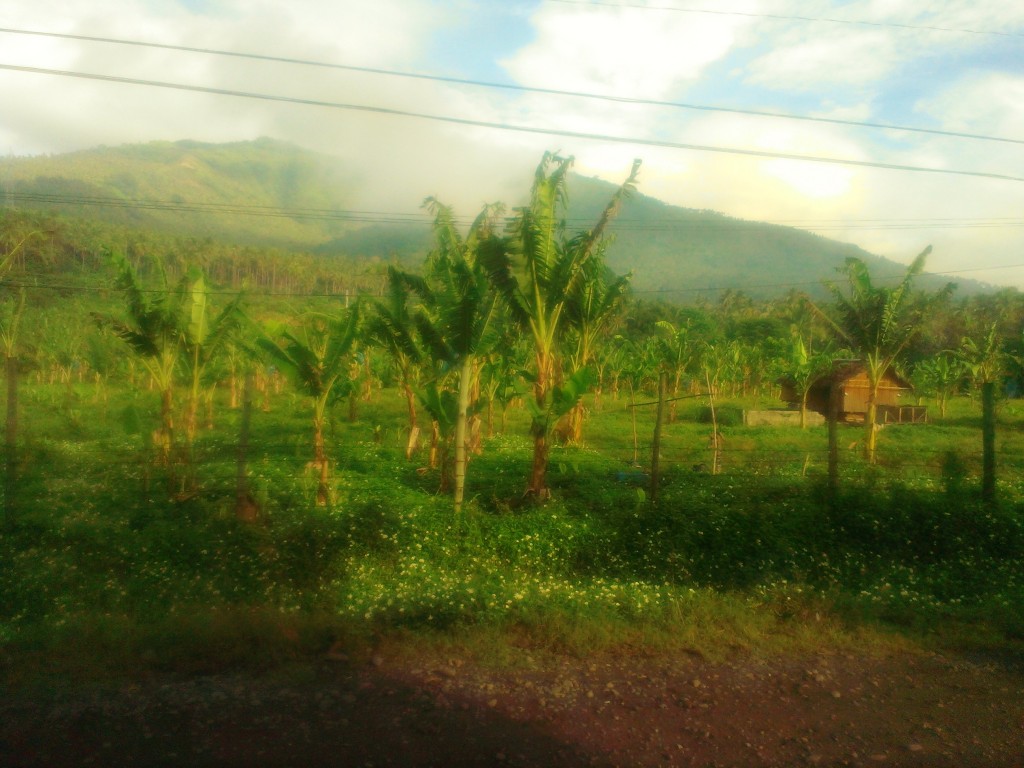[Written Jan. 10 2015]
At the end of our first full day in Davao, the capital city on the island of Mindanao, and in one word I’d have to describe it as: overwhelming. After stepping off a plane for the first time in over 24 hours, I found myself surrounded by people yelling and car horns honking, the smells of pollution and food being cooked on the street, the blazing heat of the sun as early as7:30am, and the Technicolor palate of the buildings surrounded by the green of palm trees and other vegetation. And it didn’t stop there: as soon as we left the city, we passed rural landscapes painted with mountains, forests, and farms, where the air was heavy with the humidity and the smell of coconut.
What has been so much fun since then, for the past couple of days, has been deciphering the language of Tagalog. Many signs on the street are written in English, or a combination of English and Tagalog, and there are a plethora of Spanish and English words used in the language. So even though I arrived with just a single page of common words and phrases, I have been able to understand bits and pieces of what I hear or read while we’re here. We speak with lots of people who work in NGOs, Civil Society Organizations (CSOs), and government agencies, so they all have fairly advanced levels of spoken English, but when we speak with various people from the villages or smaller groups we need to translate back and forth. Then it is so exciting for me to be able to put the pieces together as I listen to the Tagalog and try to put the ideas together before I hear the translated version.
Words such as sige (“go ahead” or “continue”), iglesia (“church”), gusto (like, as in “I like…”) and ¿kumusta ka? (“how are you?”), resemble the Spanish equivalents of sigue, iglesia, gustar and ¿Cómo estás? But the real meat of the language that we’ve encountered lies in the words that I don’t recognize at all. Along our trip so far I’ve tried to gather a sort of vocabulary list, many of which are of course products of the topics about which we’ve been conducting our research. I’m putting a disclaimer here now that some of these words I only heard, and didn’t see written down, so it’s possible that my spelling is slightly atrocious. But Tagalog seems to be a phonetic language like Spanish, so just read it as it appears and we should be fine.
Not unexpectedly, the first word we all learned and have tried to use is salamat, or thank you, and if we want to express more cordiality we could say daghang salamat (thanks very much) or even sukran (many thanks). Today when we were discussing the zones of peace and various Culture of Peace workshops that have been conducted, I learned Mesa ng kapayapaan, or peace table, a physical table where people are supposed to come together to resolve their conflicts and shakes hands, rather than allow it to escalate or resort to violence. A few days ago we learned about the terms balikIslam and balikLumad, which literally translated mean to return to Islam or Lumad (the Indigenous Peoples), but are used to mean people who have converted to these religions. Then there are words like sokoan, meaning “concern for others”, or kobatan, which is a place where war has been. Lastly, in a conversation about the inter-religious dialogues that have taken place in recent years, we learned that, the word “forgiveness” translates slightly differently in three of the local languages: Tagalog, Cebuano, and one of the northern dialects. In Tagalog, the word patawan literally means bargaining; in Cebuano, pasailo means contract; and in the north, bakawan means erase.
I know there’s no way for me to learn the language in the two weeks that I’m here, and that’s not even though that’s not the purpose of this trip, but I still love to do it. As evidenced by the various words for “forgiveness”, it really can reveal some of the diversities and limitations of translation. In a context that is as multilingual as the island of Mindanao, again I think the best word to describe the experience, at least in English, is overwhelming.


